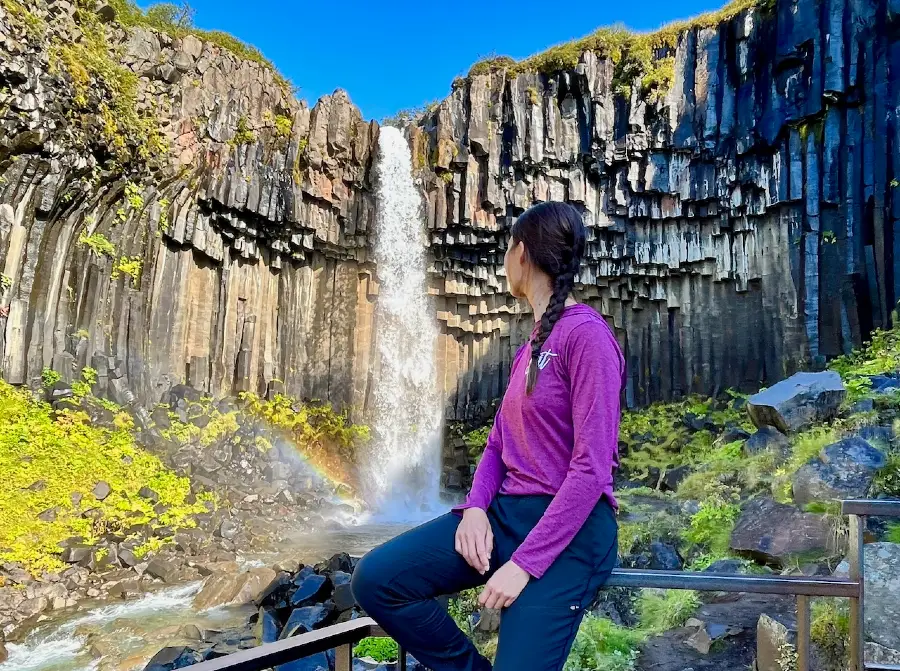Iceland is generally a cold destination year-round. August signals the end of summer there but is one of the country’s warmest months, enabling visitors to spend more time outside.
I visited Iceland last August, and here, I share firsthand tips on doing so. This post covers:
- ✨ Unique things to do in August
- 👍 Pros and cons of visiting then
- 🧦 What to pack for summer
- ❄️ Weather conditions
- 🍀 Firsthand tips for visiting
🇮🇸 Planning a Trip to Iceland: 11 Practical Things To Know
Lists By Lukiih is readers-supported. When you buy with my affiliate link, I may earn a small commission. Thanks!
August Weather in Iceland
Iceland has four seasons: spring, summer, fall, and winter. August is one of the warmest months of the year and the last official month of summer.
| Season | Months | Average Temperatures | Daylight Hours |
|---|---|---|---|
| 🌱 Spring | Mar-May | 30-50 °F | 12-16 |
| ☀️ Summer | Jun-Aug | 45-57 °F | 15-22 |
| ⛅️ Fall | Sep-Nov | 32-51 °F | 11-12 |
| ❄️ Winter | Dec-Feb | 30-37 °F | 4-7 |
Iceland is known to have volatile weather conditions year-round, so it’s not uncommon to experience what feels like all four seasons in one day, even in the summer.
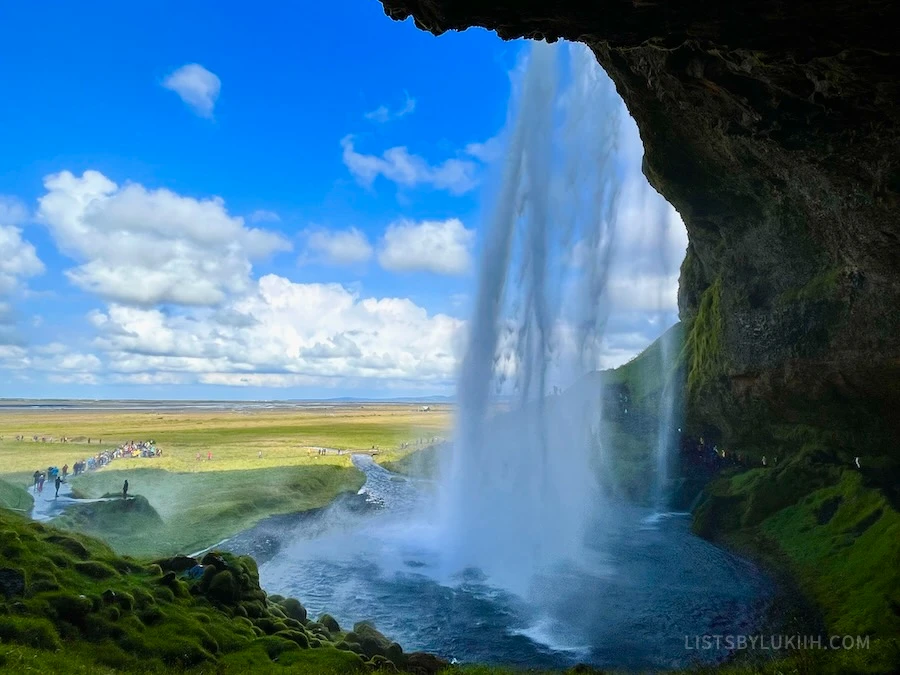
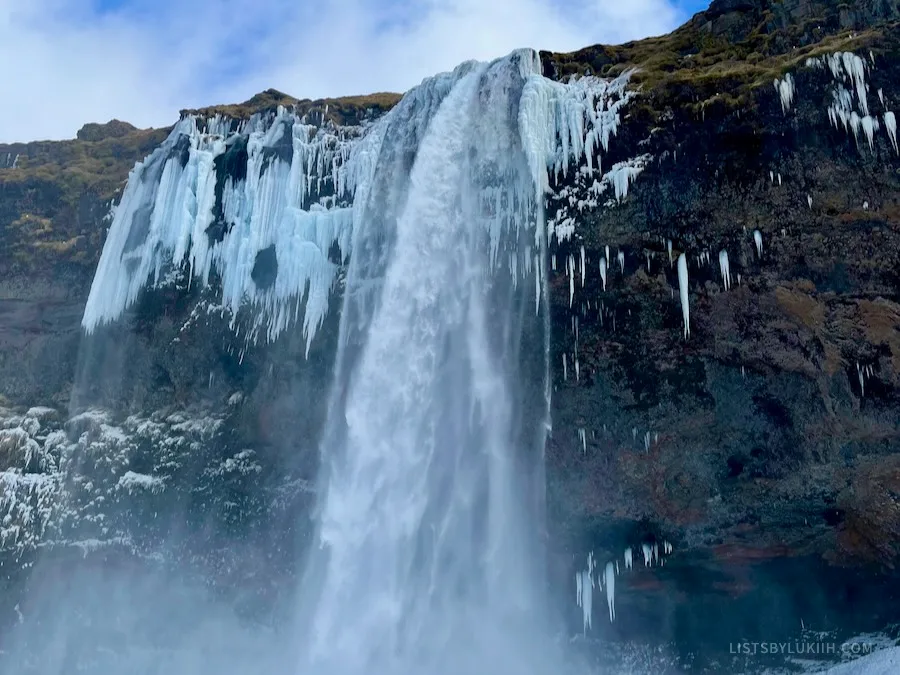
☀️ Early August Weather Conditions in Iceland
You’ll generally experience Icelandic summer weather during the beginning of August. Here are some averages to know:
- 🌡️ Average temperature – The average temperature ranges from 48 °F to 57 °F in early August, which is considered warm for Iceland.
- 🌧️ Rainy days – August averages 13 rainy days out of 31. Rain is less common during the first half of the month, with about a 35% chance of rain daily.
Iceland doesn’t have a rainy season, but most rain is from October to February. August doesn’t experience heavy rainfall by Iceland’s standards.
- ☀️ Daylight hours – August starts with 18 hours of daylight, so you’ll have plenty of time to explore.
☀️ Late August Weather Conditions in Iceland
During the second half of August in Iceland, you’ll start experiencing slightly cooler temperatures and hints that winter is approaching. Here are some averages to know:
- 🌡️ Average temperature – The average temperature ranges from 45 °F to 55 °F for the second half of August.
- 🌧️ Rainy days – Late August will continue to see rainy days, and the chance of rain increases to 44% every day by the end of the month.
- ☀️ Daylight hours – August ends with 15 hours of daylight, so you’ll still have plenty of time to explore.
🍀 Lukiih’s Experience With Visiting Iceland in August
I visited Iceland for a week in mid-August and primarily explored the South Coast.
During my trip, I was lucky to experience sunny days and relatively pleasant weather most of the days.
- Day 1 – Cloudy and sunny with an average temperature of 55 °F in the afternoon.
- Days 2-4 – Sunny with an average temperature of 57 °F in the afternoon.
- Day 5 – Sunny, except when it hailed during my glacier hike for about an hour.
- Day 6 – Sunny with an average temperature of 54 °F in the afternoon.
- Day 7 – Cloudy, windy, and rainy all day.
While traveling, I primarily wore two to three layers, including a base layer, a middle layer, and a puffer jacket as my outer layer. Scroll down for an Iceland summer packing list.
This one-week Iceland itinerary is ideal for the summer season.
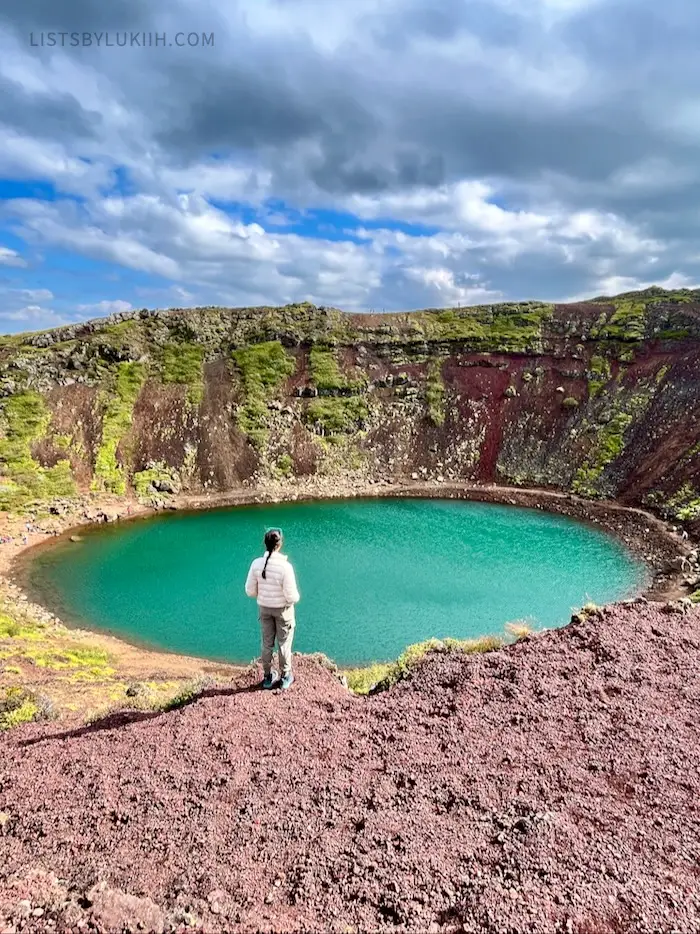
Is August a Good Time to Travel to Iceland?
If you like warmer climates and want to see Iceland’s stunning natural landscapes as much as possible, the summer months are the best months to visit the country.
Having visited Iceland in August, I can say it’s a great time to visit Iceland, but there are also some downsides.
👍🏻 Upsides of Visiting Iceland in August
Visiting Iceland in the month of August has a few upsides:
1. August has longer days for more exploration.
In August, you’ll have long daylight hours ranging from 15 to 18 hours daily. The longer days give you more time to explore the country’s natural landscapes while it’s light out.
Iceland’s sun schedule in August is:
| Timing | Sun Rises | Sun Sets |
|---|---|---|
| Early August | As early as 4:30 am | As late as 10:30 pm |
| Late August | As early as 6 am | As late as 8:45 pm |
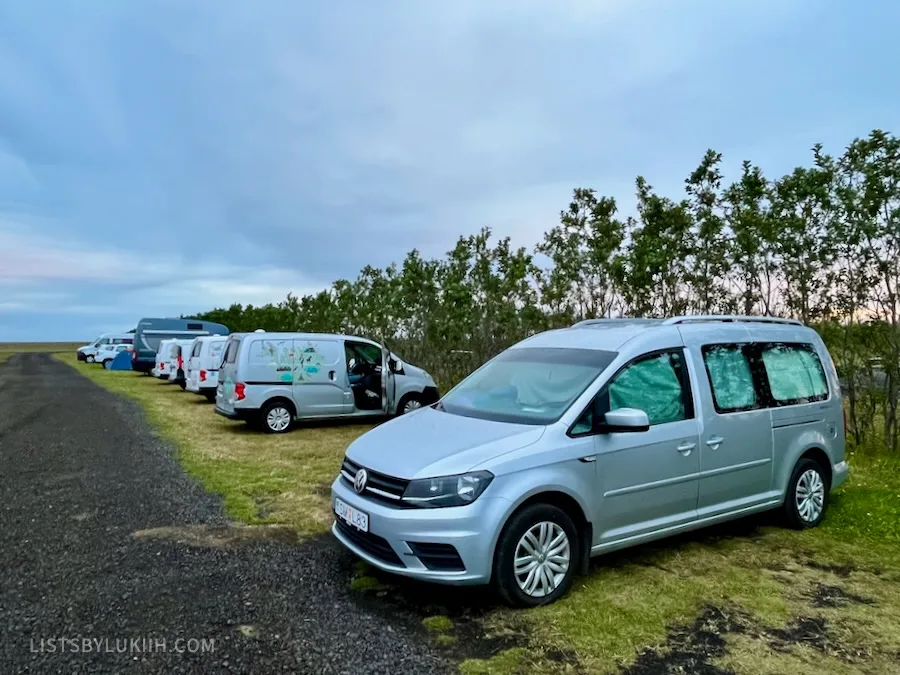
2. August has enough nighttime to give you a good night of rest.
Iceland experiences a phenomenon called the midnight sun, where you can see light 24 hours a day. It’s fascinating, and it happens in June. However, visitors also report having difficulty sleeping.
In August, you’ll have a more ideal ratio of daytime and nighttime hours. You’ll get long daylight hours and 7 to 8 hours of nighttime for sleeping.
3. August is one of the warmest months of the year.
July is the hottest month in Iceland, but August is just a little behind. The average temperature in August in Iceland is 46 °F to 57 °F. The Icelandic weather at this time means outdoor activities will be more available and enjoyable.
I had to carry my light puff jacket every day in August, but I also had moments where I was in shorts and a t-shirt during my hikes. Scroll down to see what to pack in the summer.
4. August has less rain.
You can expect about 13 days of rain in August in Iceland, which is, on average, three days less than the fall and winter months.
No rain makes being outside much more enjoyable.
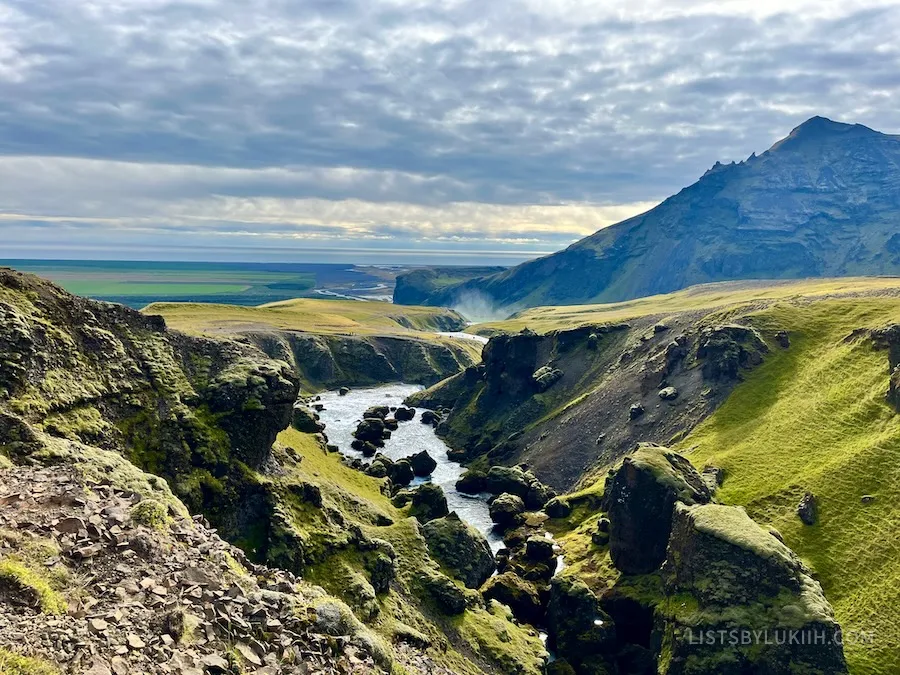
👎🏻 Downsides of Visiting Iceland in August
The primary downside of visiting Iceland in August is that it’s within Iceland’s peak season. Everything is crowded and expensive, and accommodations and car rentals are nearly booked.
Iceland has one of the highest ratios of tourists to locals worldwide, so accommodations and cars are in high demand during the summer months.
💡 Tips on Visiting Iceland in August
If you’re traveling to Iceland in August like I did, here are some firsthand tips:
- Book accommodations two to four months in advance – I tried booking accommodations about a month ahead and had very few options. This is one of the reasons why I decided to travel around Iceland in a campervan.
Learn how to plan a successful campervan trip in Iceland.
- Get Blue Lagoon tickets one to two months in advance – The Blue Lagoon is one of Iceland’s top attractions, with a timed entry ticket system. If you don’t book tickets ahead during peak travel season, you’ll be left with more expensive and less ideal time slots.
See other tips when visiting Iceland’s hot springs.
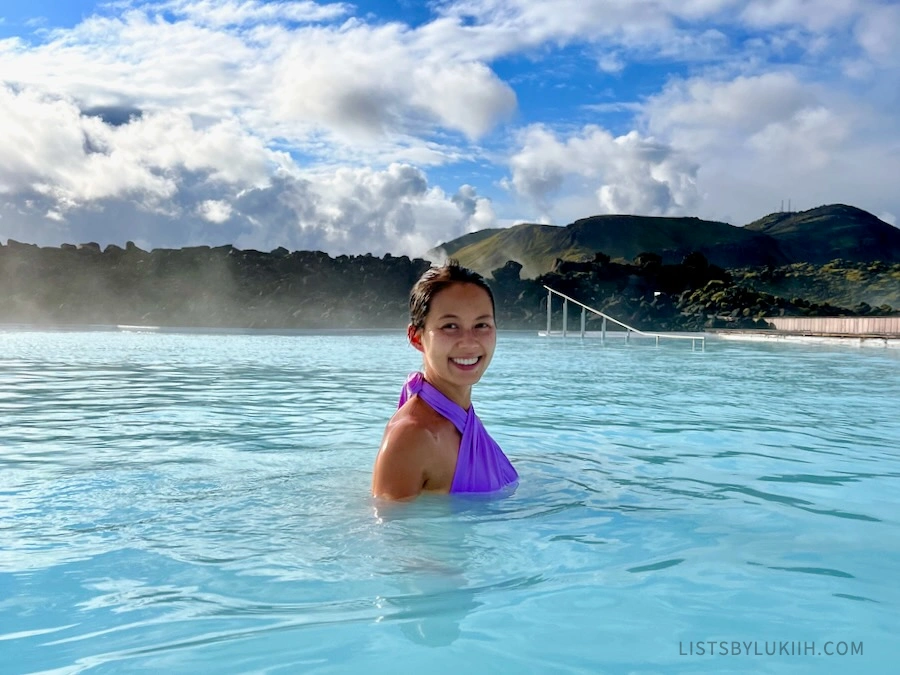
- Book rental cars and campervans ahead – Iceland campervans should be booked four months in advance during peak season, while rental cars can be booked one to two months ahead for the best deals and selection.
Iceland locals primarily drive manual cars, so automatic rental cars are usually the first ones to be booked up.
- Prepare to not get any of the top attractions to yourself – Given that August is the last month of Iceland’s peak season, you’ll see crowds at all main attractions. To minimize the crowds, visit the top attractions in the early morning.
That said, having been to Iceland in August, Iceland’s peak crowds pale in comparison to many of Europe’s and the United States’s top destinations.
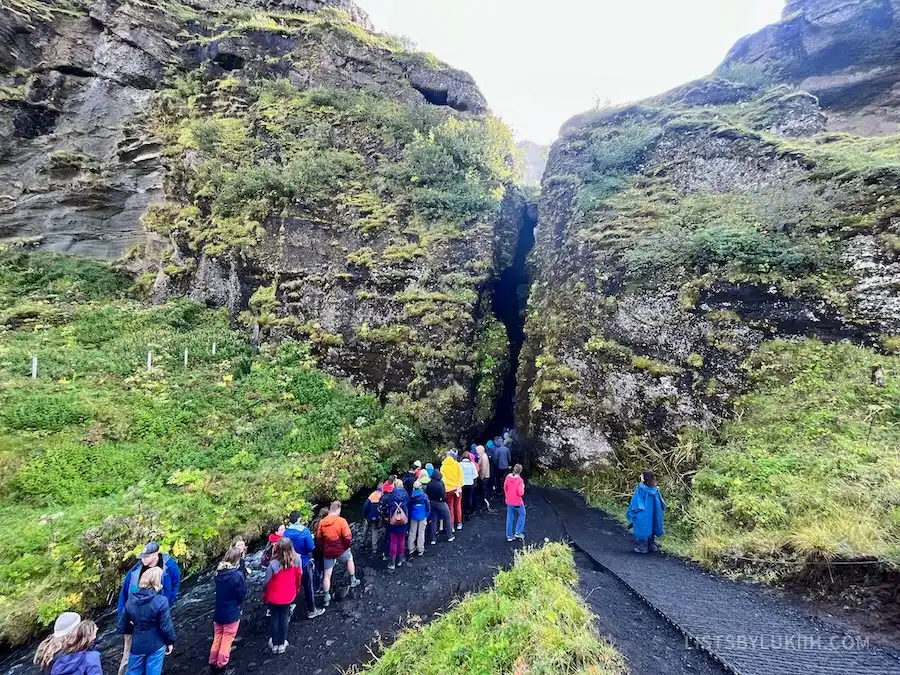
7 Great Things To Do in August in Iceland
August’s warm weather and sunny days mean more activities are available for visitors.
Here are seven unique and best things to do in Iceland in August:
1. Go Hiking or Glacier Hiking
🏔️ Why: With its breathtaking natural landscapes, Iceland boasts amazing hikes around the country, and August’s weather is the ideal hiking temperature.
🌟 Where To Hike: Here are five diverse hikes on Iceland’s South Coast:
- The Highlands – This area in the middle of Iceland is largely uninhabited and composed of volcanic deserts. Within it, the Landmannalaugar area is extraordinary and stunning, with several trail options.
For a day trip, you can hike the Brennisteinsalda-Blahnukur loop, which remains one of my favorite hikes ever.
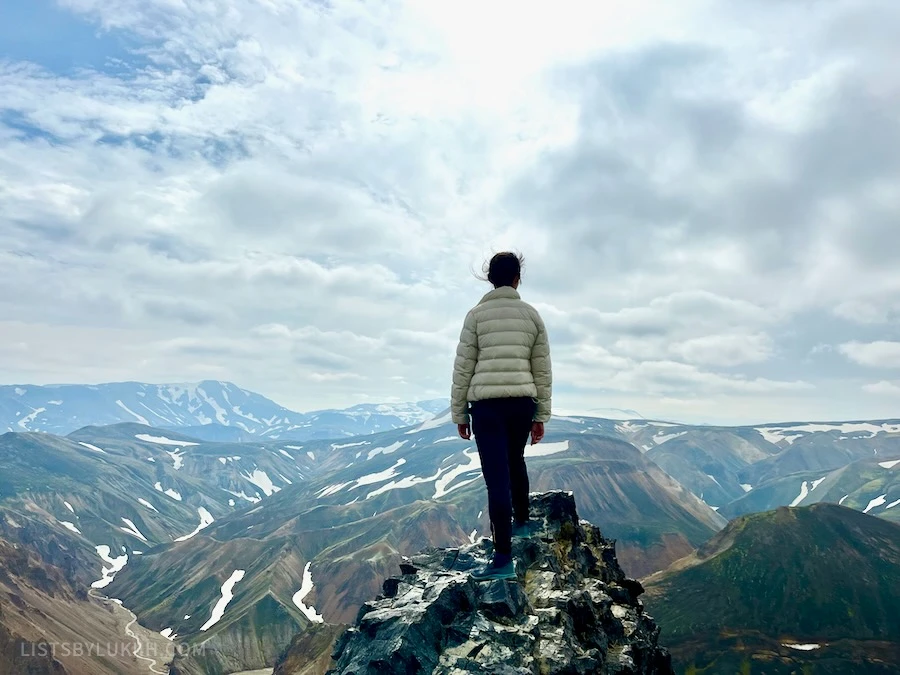
- Glymur Waterfall – This is an enjoyable, moderate four-mile hike involving a log crossing, a cave pass, some steep areas, and different viewpoints of the tall Glymur waterfall. It’s located a one-hour drive from the capital city, Reykjavík. Despite hiking Glymur Waterfall during the only day I experienced bad weather, I still thought it was an incredibly fun hike.
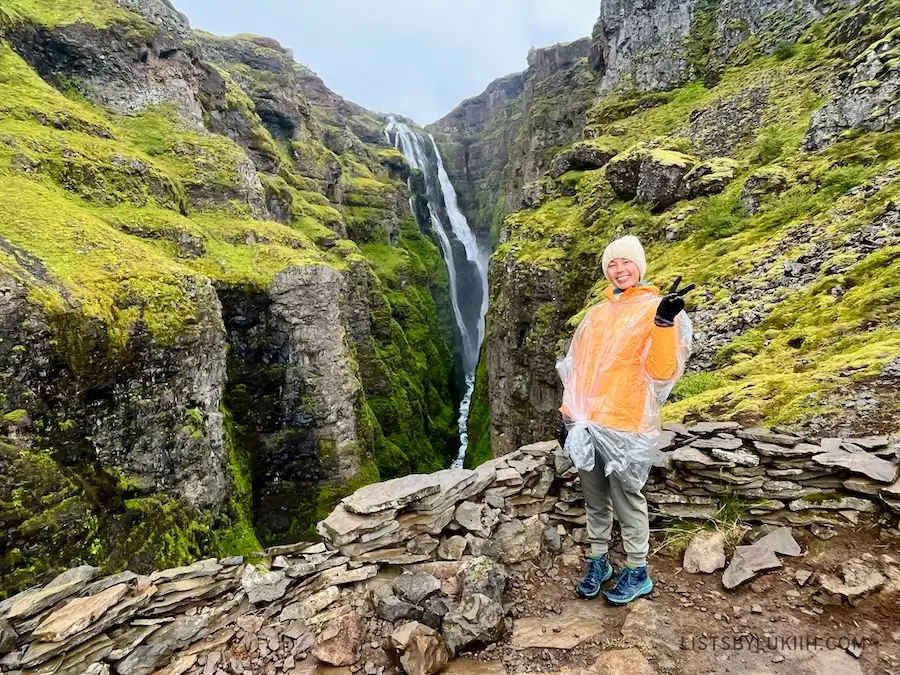
- Svartifoss – For an easier hike, consider doing the 30 to 60-minute hike in Svartifoss. The hike leads you to a unique waterfall located between basalt columns formed by lava cooking and contracting.
Because the waterfall is not located right off the road like other popular ones, Svartifoss is not nearly as crowded as other waterfalls.
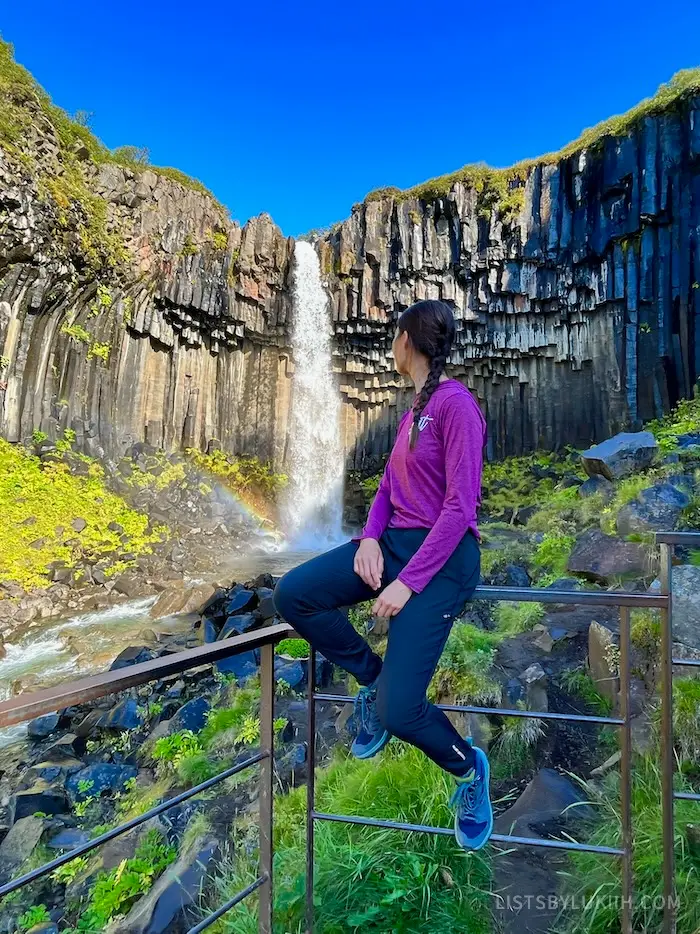
- Glacier hike – Iceland is one of the few places in the world where it’s somewhat accessible to hike a glacier. It has two main hiking glaciers: Sòlhemajökull and Vanatajökull, the biggest glacier in Europe. Glacier hiking is a unique experience where you get to marvel at all the blue ice surrounding you.
See what to expect and wear on a glacier hike.
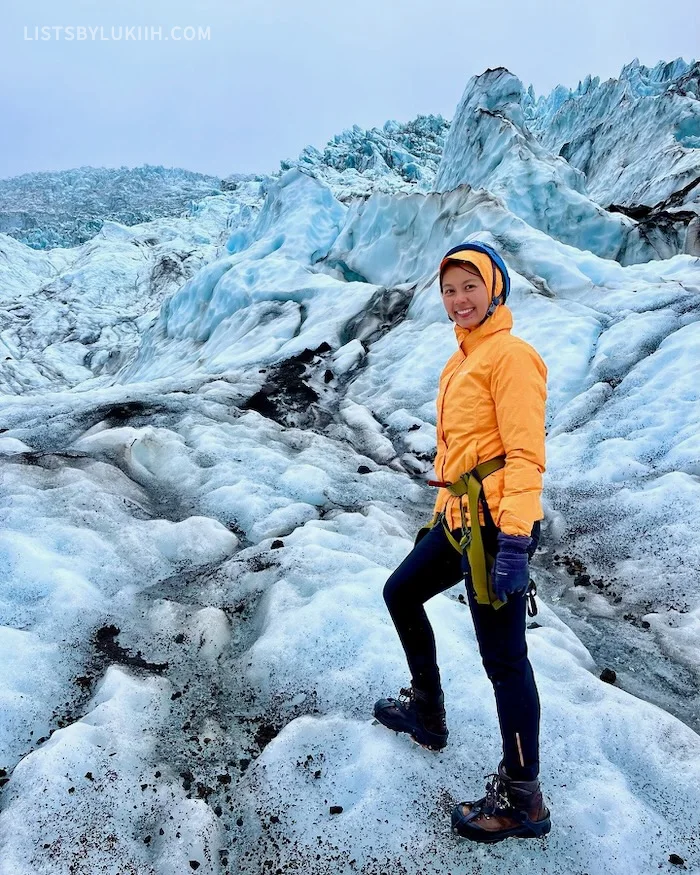
Iceland’s weather is volatile, even in the summer, so always carry some rain gear and layers when hiking. Weather on a glacier mountain is even more volatile. My glacier hike started sunny and then suddenly hailed.
2. Road Trip on the Ring Road
🚙 Why: Iceland’s Ring Road, the main road that wraps around the country, is ideal for a road trip because of its well-maintained road conditions and connection to many of Iceland’s main attractions. You don’t need to worry about ice or as much rain on the roads in August.
Iceland has unique road rules and driving norms. Familiarize yourself with them before road-tripping there.
🍀 Lukiih’s Experience: I had an amazing time doing a campervan road trip in Iceland. I don’t particularly like driving, but driving on Iceland’s roads while surrounded by spectacular nature is a memorable experience. I’m now biased that it’s the best way to see the country.
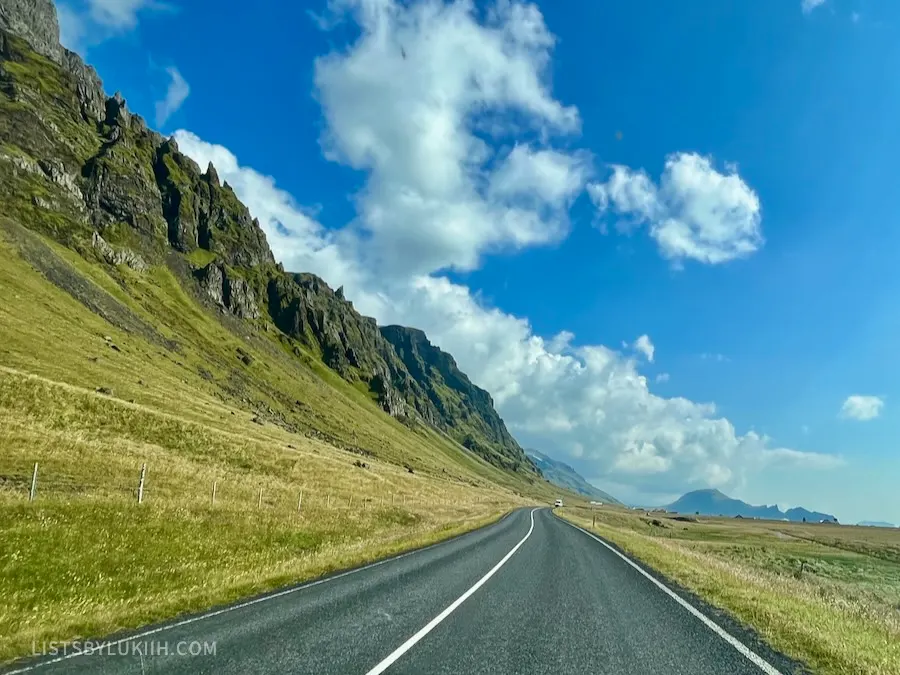
3. See Iceland’s Unique Wildlife
🐋 Why: Iceland is a fantastic place to whale watch, see puffins, and get a glimpse of an arctic fox. Seeing wildlife is easiest in the summer and nearly impossible in the winter weather.
Puffin and whale watching are Iceland’s two most beloved wildlife experiences.
📍 Where To See Puffins: Puffins migrate to Iceland’s coastal cliffs from May to August to lay their eggs. They can be spotted throughout summer, and the last month to catch them is in August. Látrabjarg in the Westfjords and the Westman Islands are some of the best places to spot them.
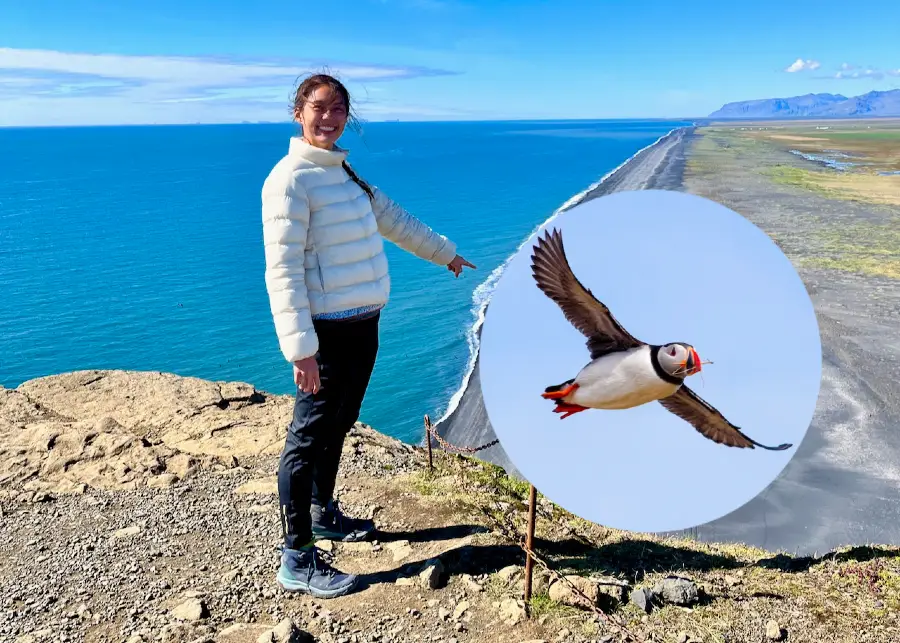
📍 Where To See Whales: Iceland is the whale-watching capital of Europe (e.g., it has blue whales, fin, sperm, humpack, and minke whales). While you can do it year-round, the highest chance of seeing whales is during the summer.
The best places to whale watch are in the north, in Akureyri and Húsavík, but if you’re lucky, you might be able to see some in Faxaflói near Reykjavík.
Since whales don’t appear on command, you can increase your chances of seeing one by going on a whale-watching tour.
Iceland also has twice as many sheep as local residents. While you drive around in the summer, you’ll see sheep everywhere. Make sure to watch out for them and other wildlife while driving.
4. Attend Iceland’s Cultural Events
🌈 Why: August is the time of the year when locals get to be outside in the sun and enjoy some big celebrations. You get the unique opportunity to be part of these cultural events.
🌟 August Events: Here are some of Iceland’s best cultural events taking place in August:
- Þjóðhátíð – This is an annual festival held in Vestmannaeyjar, an island towards the south of Iceland. It’s the biggest outdoor festival in the country and features bonfires, fireworks, and outdoor concerts. It starts on August 2nd, 2024.
- Reykjavík Pride (aka Hinsegin dagar) – This is a national festival celebrating the “freedom of being and living as you are.” The pride parade attracts more than 100,000 visitors, which is impressive for a country with only 400,000 locals. It starts on August 4th, 2024.
- Reykjavík Marathon – This marathon has taken place since 1984 and it’s happening on August 24th, 2024.
- Reykjavík Culture Night – This celebrates a diverse set of cultural events for residents. This cultural festival is free and takes place on August 24th, 2024.
Reykjavík is home to Iceland’s only international airport, so timing a cultural event towards the end or start of your trip is a good idea.
5. Camp or Sleep in a Campervan
⛺️ Why: Iceland not only has beautiful scenery, but also well-maintained campsites and a very low crime rate. This makes it ideal for camping in a tent or campervan, and the perfect time to do it is in the summer.
Here’s how to plan a campervan trip in Iceland in the summer.
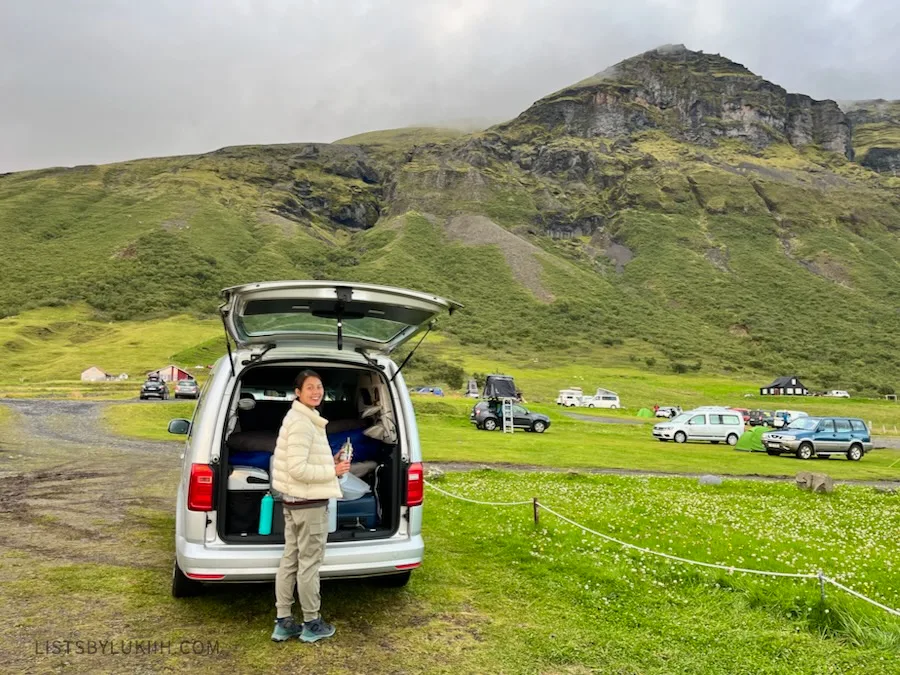
📍 Where To Camp: Iceland has campsites all around the country and many of them are accessible on the Ring Road.
Happy Campers has built this useful map of all the campsites in Iceland. Searching for “Iceland campsites” on Google Maps will not list all of them.
6. Get In the Water in August
💧 Why: Iceland offers a lot of water-related activities and the best time to go in the water is when the weather is warm.
🌟 Best Water Activities: Here are the best water activities you can enjoy in August in Iceland:
- Hot springs – Iceland boasts more than 40 natural hot springs. The weather is always cold enough for visitors to enjoy them, but some hot springs are difficult to reach in the winter months. For example, the Hrunalaug hot spring requires a short hike from the parking lot and has no facilities, so it’s generally too cold to visit in the winter.
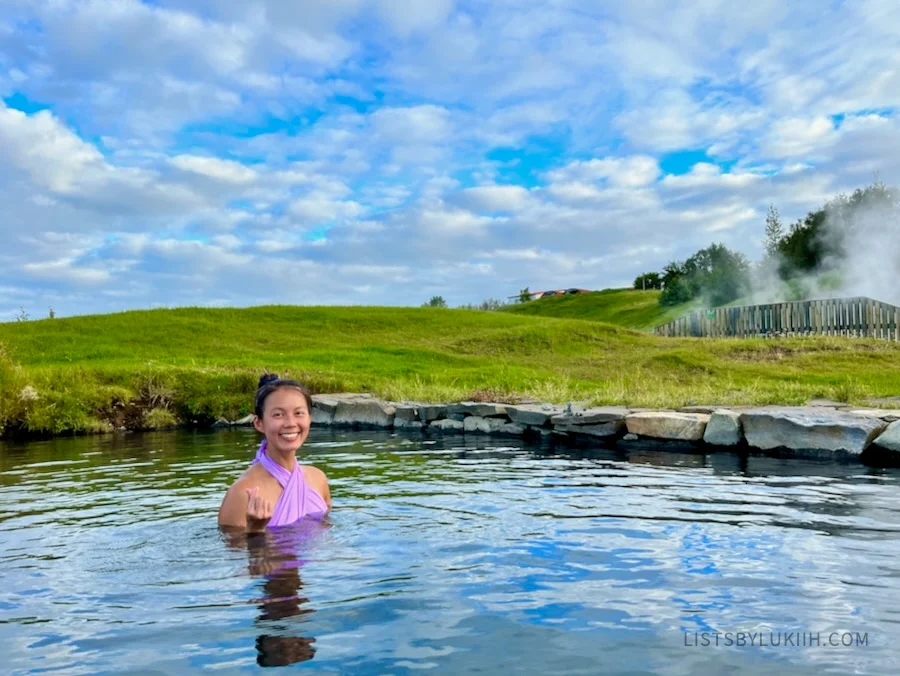
- Tectonic plate snorkeling – One of Iceland’s most unique opportunities is to snorkel between two tectonic plates in Silfra. Silfra’s water is extremely clear as it originates from glacier meltwater.
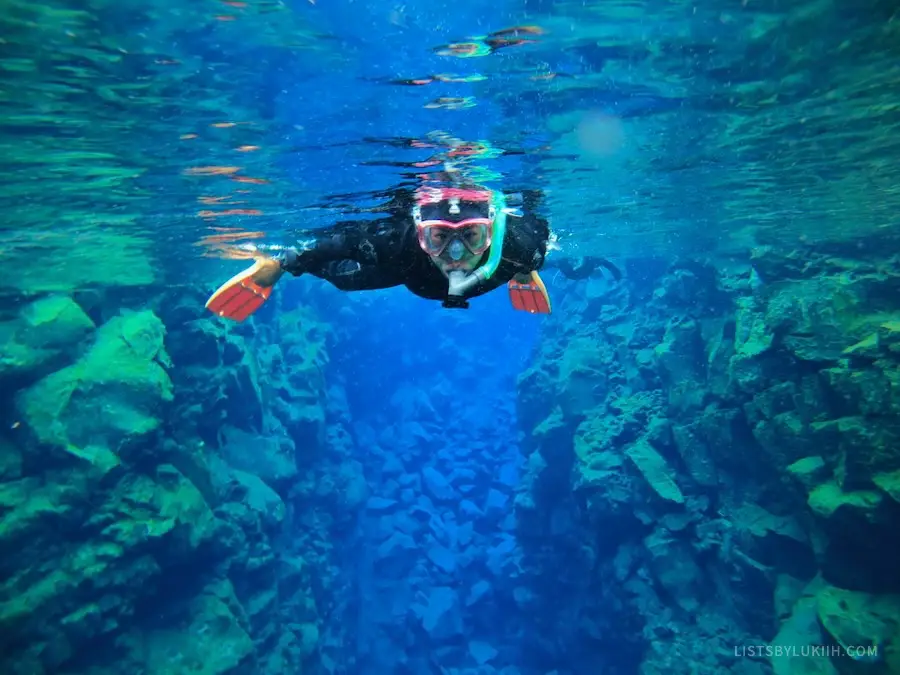
- River rafting – River rafting is a thrilling joy ride in Iceland during the summer when getting wet isn’t as cold as other times. This highly-rated river rafting tour is within the popular Golden Circle area.
7. Ride an Icelandic Horse
🐴 Why: The Icelandic horse is its own breed of unique horse that has a different and more comfortable gait. During the summer, Icelandic horses can roam around more freely and have more playful personalities.
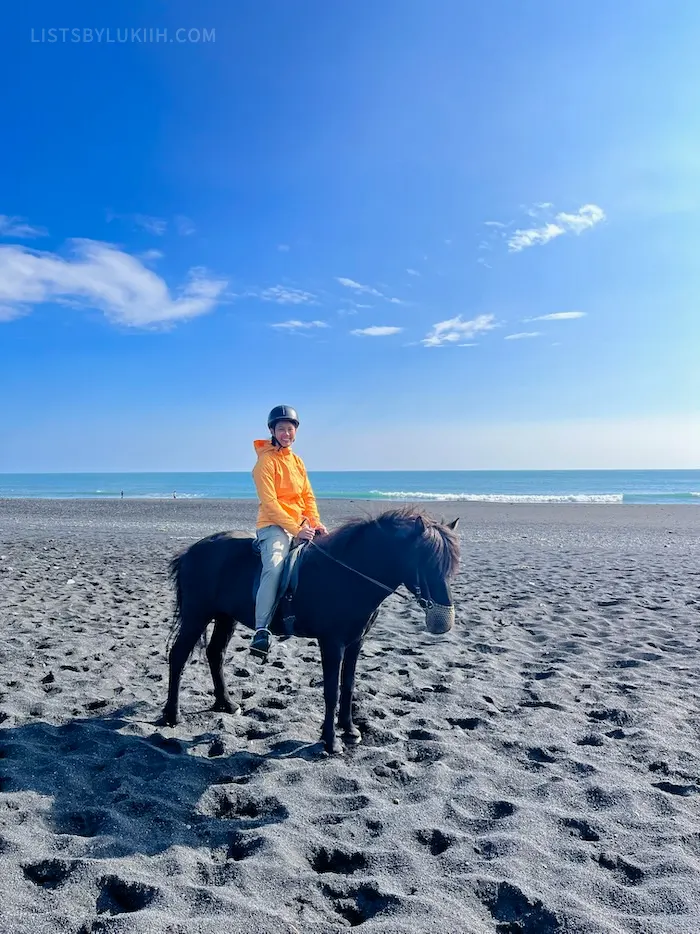
📍 Where To Ride: Iceland offers several horse riding tours, such as this highly-rated one from Reykjavík. I did a horse-riding tour from the town of Vík on the South Coast because I wanted to do it on one of Iceland’s black sand beaches.
Can You See the Northern Lights in August in Iceland?
You’re unlikely to see northern lights in August. However, some visitors do catch them and the best time to see them is at the end of the month.
Iceland’s northern lights (aka aurora borealis) can typically be seen between October and April. They’re only visible in the dark, and there is too much daylight in August.
If you still want to take a chance, you can see the aurora borealis in all parts of Iceland, but north Iceland and the West Fjords are some of the best places to catch them. Jökulsárlón Glacier Lagoon is a great place to see them on the south coast.
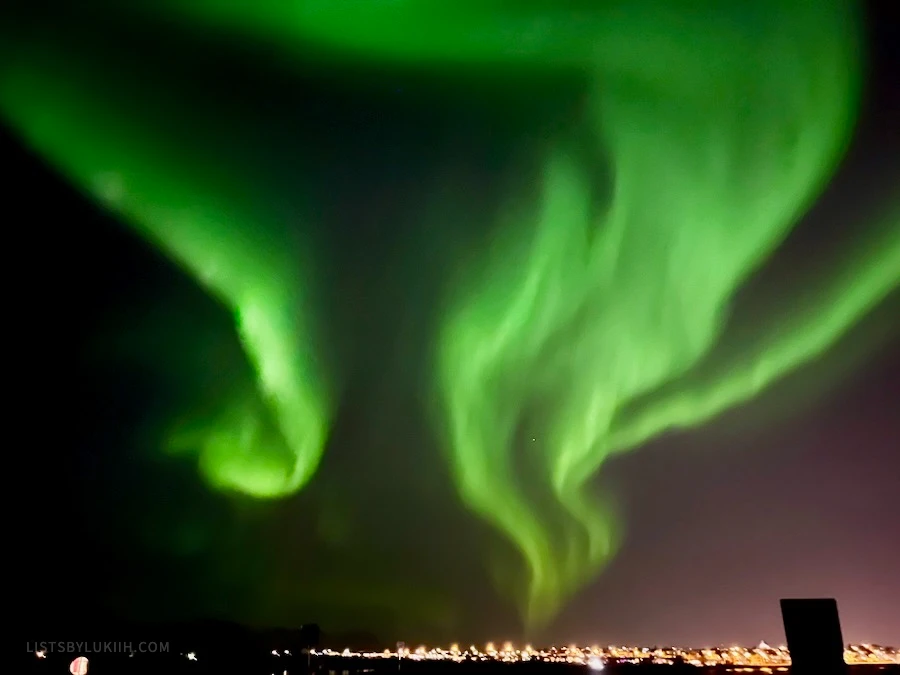
Can You Climb an Ice Cave in August in Iceland?
Ice cave climbing is a popular activity for adventurous visitors, but you won’t be able to do it in August. During the summer months, the temperature is too high, and the glaciers are slowly melting.
A great alternative to ice cave climbing is a glacier hike in Iceland.
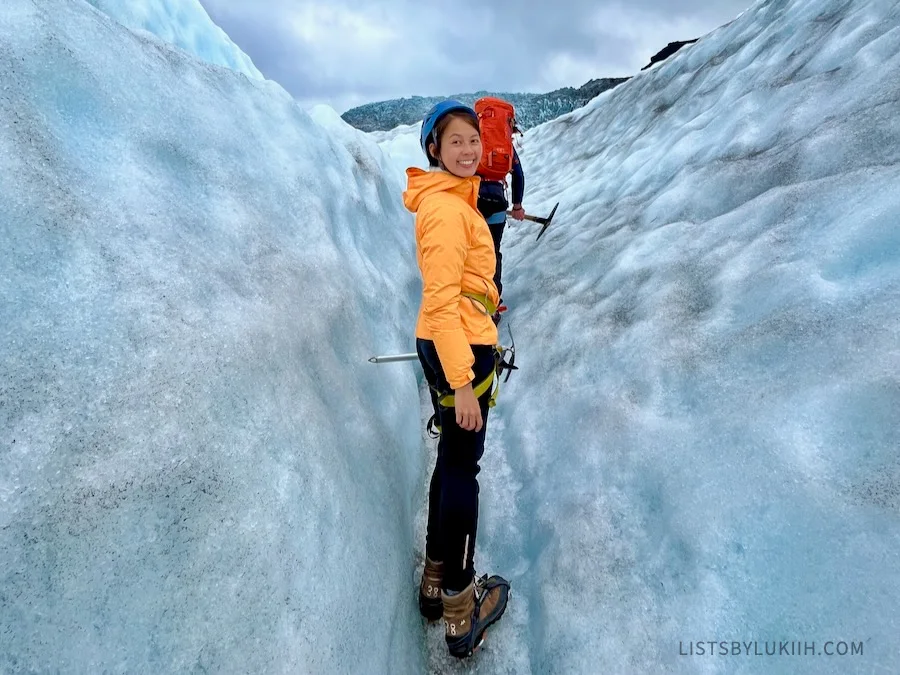
What to Pack for Iceland in the Summer
Here’s a detailed Iceland packing list that accounts for popular summer activities and the country’s unpredictable weather.
If you’re traveling around Iceland in a campervan, see the Iceland campervan packing list.
🥾 Shoes To Pack for Iceland
If you’re aiming to travel light, you only need two shoes in Iceland:
- Waterproof hiking shoes – Iceland’s weather is unpredictable, even in the summer. Wearing waterproof shoes is key, especially if you’re hiking or plan to be outdoors for a few hours, which most visitors are.
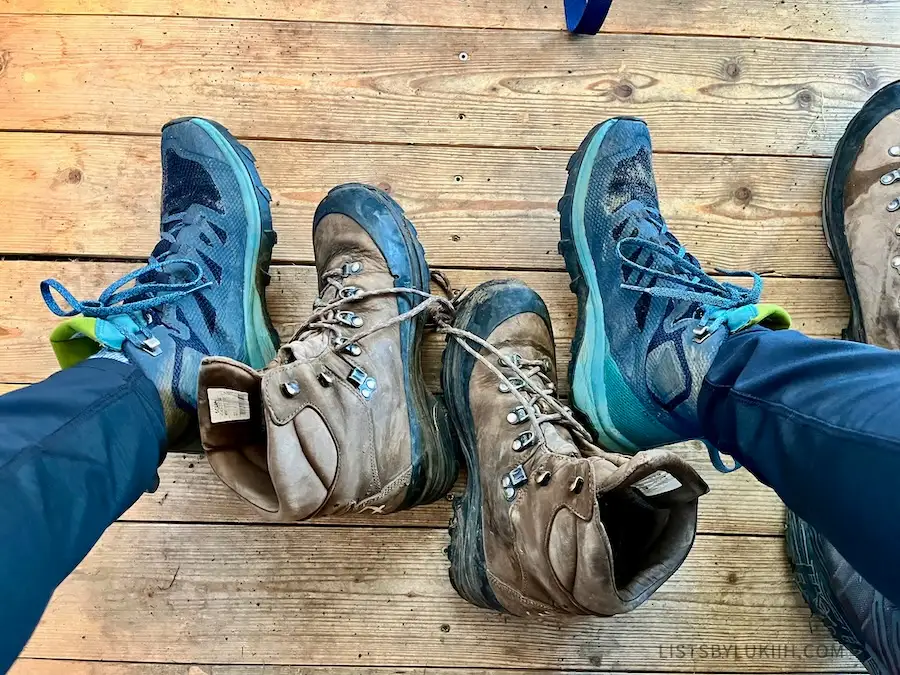
- Flip flops or sandals – Pack sandals for showers, hot springs, and for the few times when you don’t want to wear your hiking shoes.
- Sneakers (optional) – If you have room, you can pack a pair of sneakers, but you likely won’t wear them much unless you plan to mainly visit Reykjavík and the tourist-friendly Golden Circle.
🧦 Clothes To Pack for Iceland
When packing clothes for Iceland, bringing extra layers is key.
- Bathing suit – You’ll want at least one pair of swimsuits for the hot springs.
- Warm thermal (inner layer) – You’re guaranteed to have cold moments during Iceland’s summer months, so bring a base layer that will keep you warm. I brought my Smartwool tops and bottoms. Fleece-lined leggings also work well.
- Sun hoodies or t-shirts – For warmer days, you’ll want to be in a t-shirt or sun hoodie for extra sun and wind protection.
- Sweater or hoodie (middle layer) – A fleece jacket or wool sweater are great options.
- Packable down jacket (outer layer) – Bring a down jacket that’s easy to throw on as the weather changes.
- Waterproof jacket and/or rain poncho (protective layer) – I bought this rain jacket specifically for my Iceland trip and was happy with it. I also brought this rain poncho, which I wore on top of my rain jacket during my rainy hike.
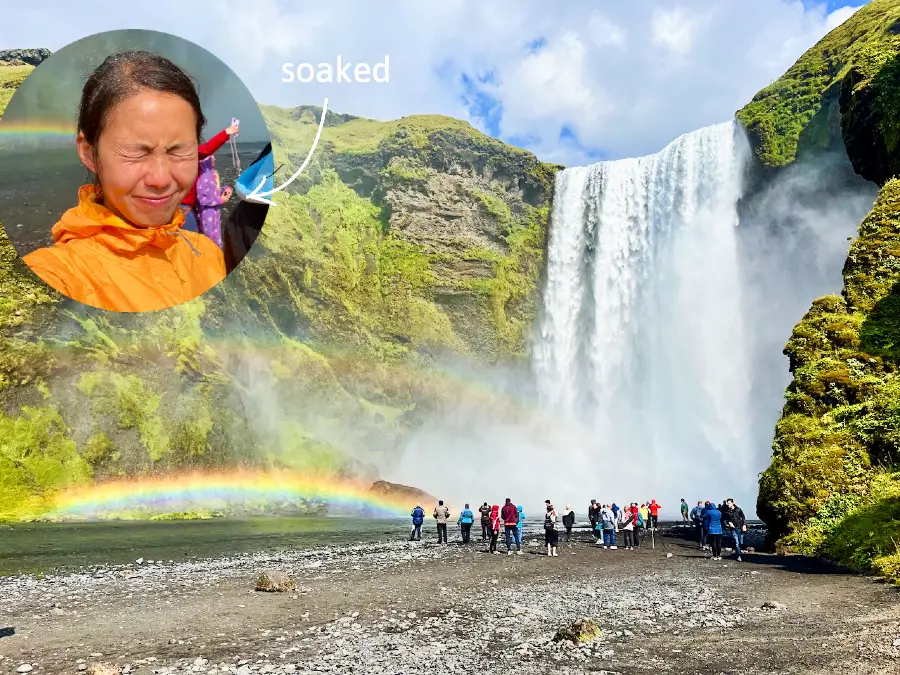
- Hiking pants – Iceland’s plethora of natural wonders means you’ll mostly want to be in athletic, comfortable clothes. I bought these quick-dry hiking pants specifically for this trip and they were amazing (very quick to dry).
My biggest Iceland packing regret was not investing in a pair of waterproof pants. Rain pants might feel like overkill, but I got soaked and very cold while hiking in the rain.
- Warm hiking socks – Bring extra socks to change into if they get wet from waterfalls, sudden rain, or river crossings. Water-resistant socks are great in Iceland.
- Airplane clothes – I forgot this and wished I had brought a clean set of clothes for my flight home.
🧤 Accessories to Pack for Iceland
Here are essential accessories to include in your Iceland summer packing list:
- Headband and hat – You’ll need head protection in the summer. I brought both a hat and headband and was glad I did when my headband got soaked and I had to wait for it to dry.
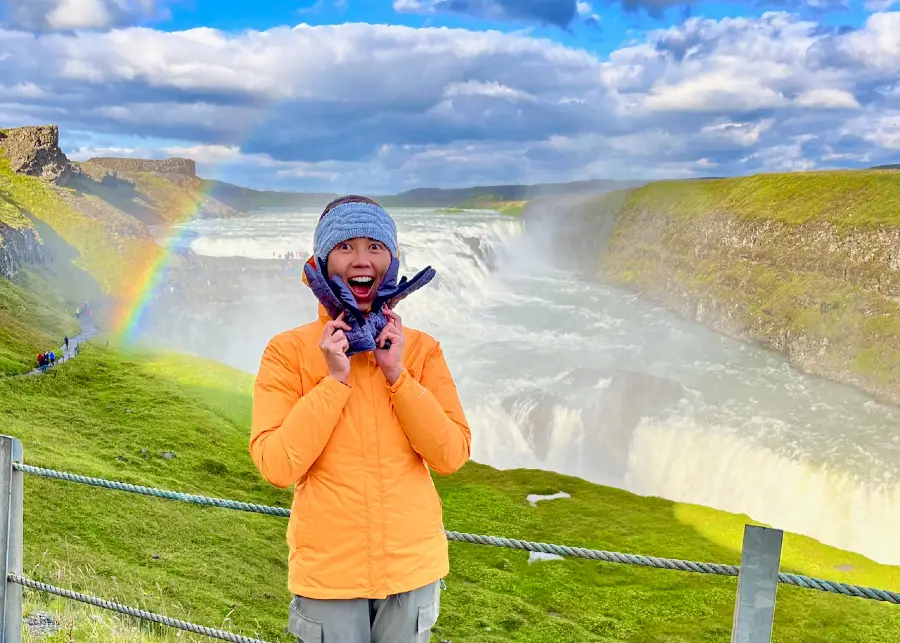
- Waterproof gloves – You’ll especially want a pair of gloves if you do a glacier hike.
- Sunglasses – The sun in Iceland is strong, making sunglasses helpful for driving and hiking. I brought my sunglasses everywhere.
- Lip balm – Iceland has cold winds and very strong sun at times, so it’s a good idea to bring lip balm with SPF.
- Scrunchies (for long hair) – You may not want to dip your hair in the hot springs, especially in the Blue Lagoon, where the high levels of silica will make your hair stiff and difficult to manage.
- Sleep mask (optional) – You’ll be getting 14 to 16 hours of daylight on average in August. If your accommodation doesn’t have black-out blinds, consider bringing a sleep mask.
🧴 Miscellaneous Items to Pack for Iceland
Here are other items to add to your Iceland summer packing list:
- Waterproof phone case – You’ll want a case for the rain and hot springs (especially the famous Blue Lagoon). I brought a waterproof phone case to all the hot springs I visited.
- Sunscreen – While you’ll mostly be in layers, you’ll need face sunscreen at a minimum. I highly recommend this lightweight travel-size face sunscreen.
Iceland is further up in the Arctic Circle and closer to the sun. People do get sunburnt in Iceland.
- Quick dry travel towel – You’ll need towels for some hot springs that don’t provide towels. I brought my quick dry towel.
- Reusable water bottle – There’s no need to buy bottled water in Iceland, so I brought my Hydro Flask everywhere. A hydration pack is a good idea if you plan to go on longer hikes.
Iceland’s tap water is one of the cleanest in the world and more than 90% of the water comes from natural springs.
- Day pack – When you go hiking or decide to spend a few hours outdoors, you’ll need a day pack to carry water and your extra layers.
The Iceland summer trip planner below has this downloadable packing list in Notion.
Iceland Summer Trip Planner
Iceland Trip Planner 2026
Make planning easier with my flexible, research-backed travel planner—shaped by real experience. It has:
- 2026 travel info
- Curated itinerary
- Practical insights & tips
- Simple budget tracker
- Destination-specific packing list
- Fully customizable sections
Built in Notion, this is the tool I personally use to plan every trip. I genuinely love it and creating a Notion account is free.
Lists by Lukiih is a small site I fund myself. Downloading my trip planner is the best way to support me and keep it running—thanks!
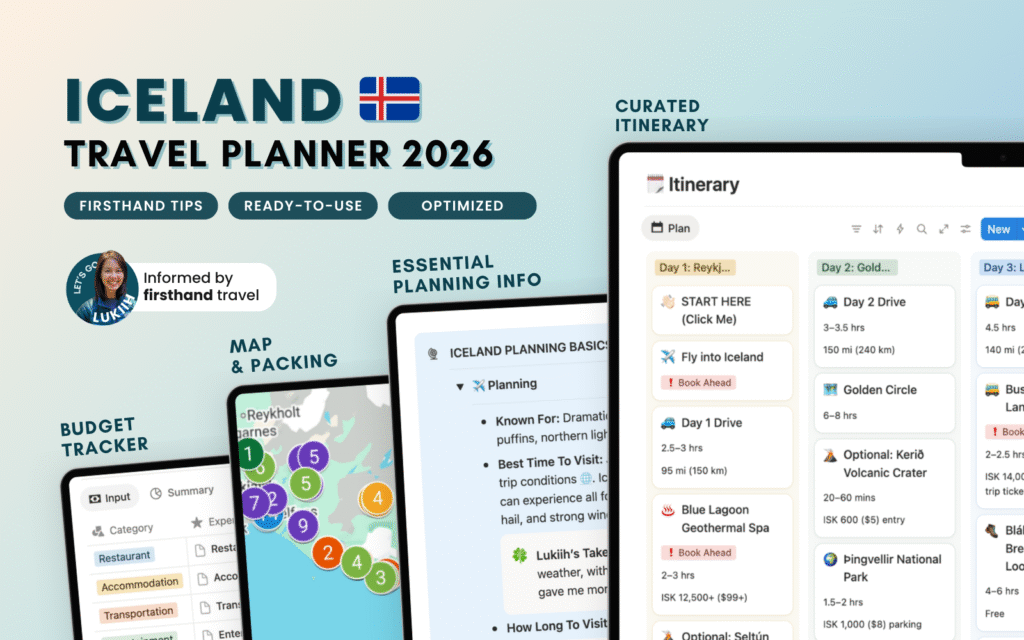
Iceland Travel Guides
- 🇮🇸 Planning a Trip to Iceland: 11 Practical Things To Know
- 🚙 Iceland South Coast: Efficient 7-Day Road Trip Itinerary
- 🚐 My Iceland Campervan Trip: How To Plan One + Tips
- 💰 My Iceland Trip Cost: My Budget Breakdown (2025)
- 🧊 Hiking a Glacier in Iceland: My Honest Review & Tips
- ♨️ Hrunalaug Hot Spring: My Honest Review & Tips
- ☀️ Visiting Iceland in August: Tips & What To Know
